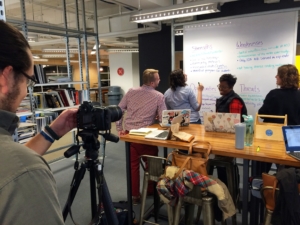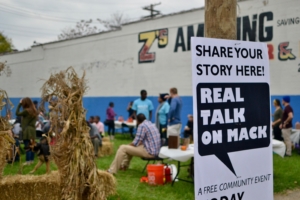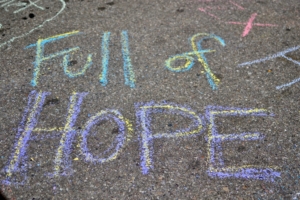For our first Challenge, Fellows partnered with MACC Development, a community development organization on the east-side of Detroit… To learn more about their story and journey, check out their website and/or hear what Director and CD Alumni Ezekiel Harris had to say here.
Walking into D&D Storage, a community business, and MACC Development’s adopted space, one might overlook the years worth of history imbued within the center’s fire-blackened walls in favor of acknowledging (or perhaps bemoaning) the out of order toilet located in the back. Yet, as the owners pointed out on a dreary day in early October, “The block burns down? We’re still here.” MACC Development agrees and takes things a step further. That is, Mack Avenue isn’t just “here”. Stagnancy isn’t a part of anyone’s vocabulary. Inside D&D, MACC’s five-person staff envisions a better community “block by block, neighbor by neighbor”.
With the amplified capacity brought by 42 Challenge Detroit Fellows, that five-person staff grew to over ~50 overnight with 240 hours of work in a given workweek expanded to 800 working hours across 5 “Challenge” Fridays. On October 1st, Fellows were prompted with the following question:
“How might we create new programs and support current projects that empower MACC Development to evolve the way the organization tackles community development?”
___________________________________________
“This is the Detroit story right now – how to develop with the community leading the dialogue” – Year 5 Fellow Julia Kowalski
42 Fellows. 8 teams. Over 40 different combined degrees and disciplines. The Year Five Fellows represent Challenge Detroit’s largest commitment to intellectual capital in the city yet.
First, Fellows spent time going out into the community and meeting with leaders of MACC Development along with their community members and volunteers. Challenge Detroit project partnerships are a collaborative experience, and that extends far beyond the traditional work environment.
Tasked with completing a food assessment for the 48214 zip code, one team visited a local school to survey children about their eating habits. This team sought to collaborate with the community, asking what their needs were before coming to any assumptions. I talked to her Challenge Detroit Fellow Julia Kowalski about how she spent her time immersing herself with and striving to be a part of the Pingree Park community. She shared that she realized that “we become empathetic when we […] allow ourselves to be curious and excited about encountering another human being”.

Fellow and Photographer Everett Cislo captures one team mid-ideation.
Julia’s eyes light up when she talks about this stage. A designer and prospective architect at Detroit Collaborative Design Center, she considers architecture to be an “extension of a person”, because, “When we make things, they are a reflection of who we are…as individuals, communities, and cultures. This is why accessible, equitable, noble design is important – because it speaks to a person’s dignity and worth”.
As part of the design thinking process, our Fellows engage in prototyping and iterative designs. The five weeks fly by and teams move towards creating implementable sets of deliverables. In this case, Fellows focus on designing concrete tools used to expand and franchise existing MACC Development needs and structures while staying true to its heritage.

Fellows introduced the “Real Talk on MACC” Event the day after their Presentation
We offered perspectives on volunteer recruitment. We offered a model for expanding their Sports Programming into a basketball and flag football league. Two different possibilities for interior design of The Commons... A model for franchising their tutoring program. A study on Food – in schools, the community, and associated areas. A replicable pilot community event, aptly titled Real Talk on Mack. A marketing strategy including a new brand, website, and video.
We offered a desire to listen and learn, shared our multi-disciplinary skillsets, along with our time, to an organization on the cusp of something great in a community that couldn’t have been more courteous, warm, or welcoming.
 Collectively, it’s up to MACC Development how it will implement our work, with Director Zeke Harris stewarding the next steps. As Mariisa Franz told me, “Whether or not they implement what we brought to the table now or a year down the road, I just hope we were able to create opportunities for growth in the organization and the community”. We’d love to have visceral, real, and immediate impact on every project that we’re a part of, but the initial impact may be much more subtle. Our challenge projects provide opportunities to gain knowledge and context that fosters growth, learning, and ultimately, the creation of empathetic leaders in Detroit. As Julia told me, “being empathetic isn’t just something we do. It’s the person that we should strive to be. It’s a process of becoming empathetic”.
Collectively, it’s up to MACC Development how it will implement our work, with Director Zeke Harris stewarding the next steps. As Mariisa Franz told me, “Whether or not they implement what we brought to the table now or a year down the road, I just hope we were able to create opportunities for growth in the organization and the community”. We’d love to have visceral, real, and immediate impact on every project that we’re a part of, but the initial impact may be much more subtle. Our challenge projects provide opportunities to gain knowledge and context that fosters growth, learning, and ultimately, the creation of empathetic leaders in Detroit. As Julia told me, “being empathetic isn’t just something we do. It’s the person that we should strive to be. It’s a process of becoming empathetic”.
Peter Walle, a Year 5 Challenge Fellow at Edward C. Levy, grew up in Troy MI and aspires to be a Detroiter. To read more of his thoughts on Detroit, check out his blog here.
